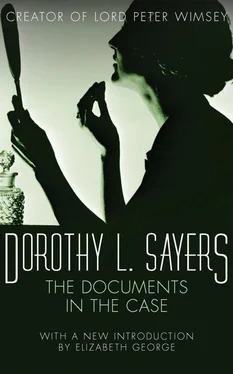Dorothy Sayers - The Documents in the Case
Здесь есть возможность читать онлайн «Dorothy Sayers - The Documents in the Case» весь текст электронной книги совершенно бесплатно (целиком полную версию без сокращений). В некоторых случаях можно слушать аудио, скачать через торрент в формате fb2 и присутствует краткое содержание. Жанр: Классический детектив, на английском языке. Описание произведения, (предисловие) а так же отзывы посетителей доступны на портале библиотеки ЛибКат.
- Название:The Documents in the Case
- Автор:
- Жанр:
- Год:неизвестен
- ISBN:нет данных
- Рейтинг книги:5 / 5. Голосов: 1
-
Избранное:Добавить в избранное
- Отзывы:
-
Ваша оценка:
- 100
- 1
- 2
- 3
- 4
- 5
The Documents in the Case: краткое содержание, описание и аннотация
Предлагаем к чтению аннотацию, описание, краткое содержание или предисловие (зависит от того, что написал сам автор книги «The Documents in the Case»). Если вы не нашли необходимую информацию о книге — напишите в комментариях, мы постараемся отыскать её.
The Documents in the Case — читать онлайн бесплатно полную книгу (весь текст) целиком
Ниже представлен текст книги, разбитый по страницам. Система сохранения места последней прочитанной страницы, позволяет с удобством читать онлайн бесплатно книгу «The Documents in the Case», без необходимости каждый раз заново искать на чём Вы остановились. Поставьте закладку, и сможете в любой момент перейти на страницу, на которой закончили чтение.
Интервал:
Закладка:
Our friend Mrs Harrison is a perfect example of this dramatisation business — and is quite capable of dramatising herself in two totally inconsistent directions at once, rather like the Victorian age. Any attitude that appeals to her sense of the picturesque she appropriates instantly, and, I really believe, with perfect sincerity. If she reads a ‘piece in the paper’ about the modern woman who finds spiritual satisfaction in a career, she is that woman; and her whole life has been ruined by having had to give up her job at the office. Capable, intelligent, a comradely woman, meeting male and female on a brisk, pleasant, man-to-man basis — there she is! If, on the other hand, she reads about the necessity of a ‘complete physical life’ for the development of personality, then she is the thwarted maternal woman, who would be all right if only she had a child. Or if she gets a mental picture of herself as a Great Courtesan (in capital letters), she is perfectly persuaded that her face only needed opportunity to burn the topless towers of Ilium. And so on. What she really is, if reality means anything, I do not know. But I can see now, what I didn’t see before, that this power of dramatisation coupled with a tremendous vitality and plenty of ill-regulated intelligence, has its fascination. If ever she found anyone to take one of her impersonations seriously, she would probably be able to live very brilliantly and successfully in that character for — well, not all her life, perhaps, but for long enough to make an impressive drama of it. Unfortunately, the excellent Harrison is not a good audience. He admires, but he won’t clap, which must be very discouraging.
‘You will gather from this that I have been seeing a good deal of the Harrisons. Quite right, Sherlock, I have. When you once make up your mind to look on people as social studies, you can get quite reconciled to their company. Mrs H. cornered me in the artistic sitting-room last night, while her husband was telling Lathom about aerial perspective, to tell me about her own personality. She feels cramped in her surroundings, it seems. Her mentality has no room to expand. It is so hard for a woman, isn’t it? Perhaps the only way is to express herself through her children — but then — if one has no children? She said she always felt she could have made herself a happy life by living for and in others. I did not say that she would probably end by devouring her hypothetical family, though I could very well see her doing it. I felt mischievous, and said that there were other forms of passionate altruism, and that I could see her in a cloister, walking serenely among the lilies and burning her soul away in contemplation. Could I really? Well, yes, there was something very wonderful about the life of devotion. I ought to write a book about it. At this point I became a little alarmed, and turned the conversation to new books. We had a little difficulty, because her idea of an important writer and my idea are not exactly identical; however, we agreed that The Constant Nymph was a very good piece of work, and, encouraged by that, she tackled the awkward question of Deadlock . I tried to explain what I had really meant by it, and she proved quite adaptable. She said she did not mind a book’s being ‘powerful’, provided it was filled with a ‘sense of the beautiful’. She thought Sweet Pepper was powerful, but nevertheless there was something about it that redeemed it. What a pity it was that Hutchinson hadn’t written another book like If Winter Comes . She thinks that if only I wouldn’t be so harsh and mocking I might write a book as strong and really beautiful as that.
These are the people who read the books, Bungie. And what are we to do about it, you and I, if we want to live by bread?
Next day I met her in the hall, dressed in a demure grey frock, with a long veil swathed nun-like about her cloche hat. She saluted me with a grave and far-away smile. I grinned cheerfully, and mentioned that I was going to watch a football match.
Your not-very-well-behaved and rather maliciousJack
12. The Same to the Same
20.10.28
My dear Bungie,
Don’t be a silly ass. I thought you had more sense than the ordinary futile sort of woman. I am not in the least fascinated by Mrs Harrison. She quite simply interests me as a type — a personality, that is. It is my job to be interested in people. I might want to use that kind of person in a book some day.
Good heavens! If I was ‘fascinated’ by her, I shouldn’t be likely to analyse her in that dispassionate way. She is essentially a suburban vamp, as I think I said before, if you have thought any of my remarks worth remembering. And I never said she was beautiful. Her mouth is sloppy and bad . .
Later: Saunders Enfield burst in on me when I was writing this, and hauled me out to lunch with him. On returning, with the better part of a bottle of perfectly good Corton inside me, I realise that the brilliant line of defence I am taking up is exactly the one I should equally have taken if the accusation had been true. I should have said just those things, in exactly that tone of exasperated superiority, and I should have elaborated them with such a wealth of detail that you could not have failed to disbelieve every word of it.
My first impulse (after lunch, I mean) was to destroy the incriminating paper, and to ignore your observations altogether. But I think that would probably have a highly suspicious appearance also. Upon my word, I don’t believe there is any convincing reply to such a charge.
Except to tell you that I honestly don’t care a damn for any woman in the world except one. And if you don’t believe that, my child, then it doesn’t matter what you think of me, because I shall be beyond caring.
I believe you’re only pulling my leg, anyhow. Blast you! Don’t do it again.
And believe me (as the business people say),Yours faithfully, Jack
13. The Same to the Same
15a, Whittington Terrace, Bayswater 22.10.28
Hullo, Bungie, darling! My God, but I’m played out! I’ve been sticking to the accursed Life like a leech, and have finished the religious outlook. Having ground it out with incredible sweat and travail, I read it through and thought it so awful that I was in two minds about chucking the whole thing into the fire. However, I didn’t, but instead went over and joined Jim in Paris for a week, on his way home, as you saw by my postcard. We had a mildly riotous time in that cheerful city, restraining each other in a brotherly way from the more perilous kinds of exuberance, and reached home feeling fit for anything. I took up the infernal religious outlook, read it through again, and came to the conclusion that it was bloody good stuff, after all! So now I am pressing forward with shouts of joy and encouragement to the critical estimate, which is the only part of the thing I really want to write at all. Dilkes, the dear old man, to whom I explained my troubles, talked to me like fifty fathers, and said extraordinarily nice things. He thinks, by the way, that the flippant and imaginative kind of biography has had its day, having been too much imitated, and that the time has come round again for solid facts and research. ‘The great humility of science, in face of the infinite and valuable variety of Truth.’ Isn’t that an exquisite Victorian remark? ‘We should pray,’ said he, making me feel like a very grubby fourth-form infant, ‘to be delivered from cleverness, because very clever people end by finding that nothing is worth while.’ So I said, rather ungraciously, that probably nothing was worth while, and he gave the funniest twinkle from under his thick eyebrows and replied: ‘You must not think that, or you will become a bore.’
My parson turns out to be rather an enlightened person. It appears he took a mathematical tripos among other things, which is one up to him. He also has read Eddington, and, moreover, took it for granted that I had read Jeans and Japp and one or two other fantastic scientists whose names I had never heard of, which was two up to him. Also, he seemed quite delighted about the whole thing, and said he was thankful to find that scientists would at last allow him to believe what the Church taught, which in his young days they wouldn’t. I should have put this down to the usual shifty ecclesiastical clap-trap, but for the obvious fact that he knew what he was talking about, and I didn’t, so, feeling a fool, I put a good face on the matter and asked his advice about the religious outlook chapter. He gave me some really very useful stuff about Victorian materialism, which you will find in the book when it’s finished. We ended by discussing, with much laughter, some incredibly silly letter from correspondents in the Daily Dispatch , one of whom said: ‘Sir, Genesis says that God made Adam from the dust of the earth. God is the initial cause and dust is protoplasm. Yours faithfully’; while the reply observed briefly, ‘Sir, Dust is not protoplasm, Yours faithfully.’
Читать дальшеИнтервал:
Закладка:
Похожие книги на «The Documents in the Case»
Представляем Вашему вниманию похожие книги на «The Documents in the Case» списком для выбора. Мы отобрали схожую по названию и смыслу литературу в надежде предоставить читателям больше вариантов отыскать новые, интересные, ещё непрочитанные произведения.
Обсуждение, отзывы о книге «The Documents in the Case» и просто собственные мнения читателей. Оставьте ваши комментарии, напишите, что Вы думаете о произведении, его смысле или главных героях. Укажите что конкретно понравилось, а что нет, и почему Вы так считаете.












